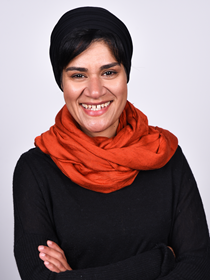Dr. El Aidy receives Athena Award from NWO
Dr. Sahar El Aidy of the Groningen Biomolecular Sciences and Biotechnology Institute ( GBB ) has been awarded the NWO Athena Award. With this award, which is one of five new Science Awards introduced by NWO, El Aidy receives EUR 50,000 towards her research costs. The Athena Award is a prize for outstanding female researchers. In addition to El Aidy, the Award also goes to Prof. Arwen Deuss of Utrecht University.

Sahar El Aidy researches into microbiomes, in particular the activity and role of gut metabolites on mental and neurological function in humans. The jury considers Sahar El Aidy to be an excellent role model: “she is a young and talented researcher, she has set up a unique and successful research group, and she has produced ground-breaking publications. She is a high-profile researcher who is very good at communicating about her research.
El Aidy always succeeds in conveying her three core messages: ‘let your food be your medicine’, ‘your gut microbes can influence the efficacy of your medication’, and ‘fundamental research into health and illness is important’.”
More news
-
14 January 2026
What the smell of the sea does to the clouds above Antarctica
